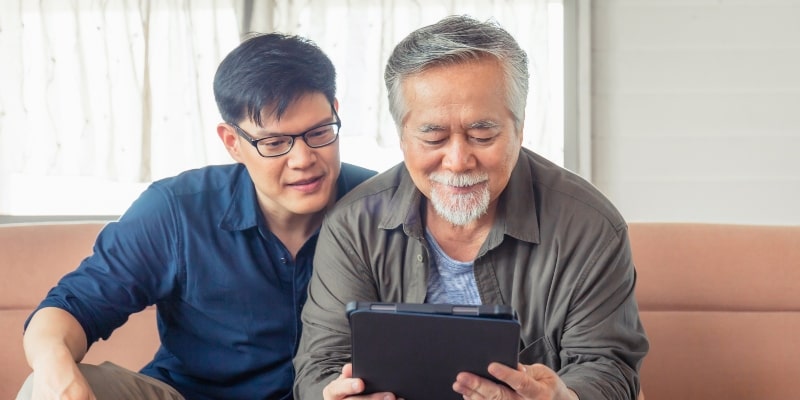Distribution of two COVID-19 vaccines is extremely exciting, and adults over 65 are some of the first in line outside of healthcare workers to receive the vaccine. However, your loved ones may be unsure, concerned, or scared to be vaccinated. It’s important to address these feelings and discuss the vaccine with your loved one in a way that makes space for their concerns and presents the research and benefits of the vaccine.
Create a Safe Space for Discussion
In starting the conversation with your loved one, open with a question:
- How do you feel about the COVID-19 vaccine?
- What worries do you have about the COVID-19 vaccine?
- What questions can I help answer about the COVID-19 vaccine?
This demonstrates that you're here to listen rather than share or impress upon them your own beliefs about the vaccine, giving them permission to speak candidly.
Listen to Learn Instead of Respond
Instead of formulating your response while your loved one is sharing their concerns, listen to understand where they're coming from and what they need from you. You can demonstrate that you're listening by maintaining eye contact, avoiding other distractions, asking questions, and repeating what you've heard.
For example, if your loved one says, "I'm not sure what to think about it," for example, you can say, "I'm hearing you say you don't have enough information. Is that right?"
Consult Their Primary Care Provider
Including your loved one’s primary care provider is a good way to take emotions out of it and get an opinion from someone who is both well-versed on the risks and benefits of the vaccine as well as your loved one's medical history.
Bring Data About Vaccine Safety
Having vaccine safety data at your fingertips can help you answer your loved one's questions and provide them with the information they need to make an informed decision. The most important things to share include:
- The risk that COVID-19 poses to somebody their age, taking into consideration any underlying conditions they have like diabetes or heart disease
- Data surrounding the studies that led up to the approval of the vaccines: the number of subjects, the safety, and the efficacy at minimum
- What to expect after receiving the vaccine—both best-case scenario (arm soreness) and worst-case scenario (flu-like illness, allergic reaction, etc.) and what percentage of people fall into each category
- The short-term and long-term safety data that are available
Just like you, your loved one has a desire to know and understand what they put in their body and what the potential risks and benefits might be. It's important that you're honest and transparent about both the known benefits and what is still unknown because you might be their primary source of information.
Be sure to rely on expert sources only: the Centers for Disease Control and Prevention, the World Health Organization, and your local Department of Health are all good resources.
Talk About Their Priorities
It's important to understand and discuss your loved one's priorities as you guide them through the decision. Which of these are most important to your loved one?
- Contributing to herd immunity to protect their friends, family, and community
- Setting a positive example to pave the way for others who are uncertain about vaccination
- Using discernment when it comes to what they allow to enter their bodies—food, drugs, vaccinations, chemicals, etc.
- Staying healthy and avoiding serious illness from COVID-19
- Returning to normalcy as soon as possible—reduction of mask use, more visitation with family, etc.
When they best understand what's important to them, it will be much easier for them to make an educated decision that they feel they can stand behind.
Step Out if You Need to
If you have strong opinions about the COVID vaccine for elderly populations, it can be very challenging to share unbiased data with your friend or family member, who is trying to make a decision for themselves. If you feel passionately about what your loved one should do, consider asking a sibling or friend to help guide them through the decision.
Show Your Support
As long as he or she is capable of making the decision, your loved one should have the final say about the COVID-19 vaccine despite your support for or opposition of vaccination at this point in time. Whatever they ultimately decide, it's important to support their decision and trust that they took their own priorities and feelings into consideration as they considered potential options. You can simply say, "I trust your judgment," or, "I support your decision," to show him or her that you're in their corner and ready to move forward together.
To learn more about navigating COVID-19 as an older adult—or as the caregiver of an older adult—visit our COVID-19 resources page. Whether you're looking for great resources or considering community living in the future, we're here to make it a little easier.





